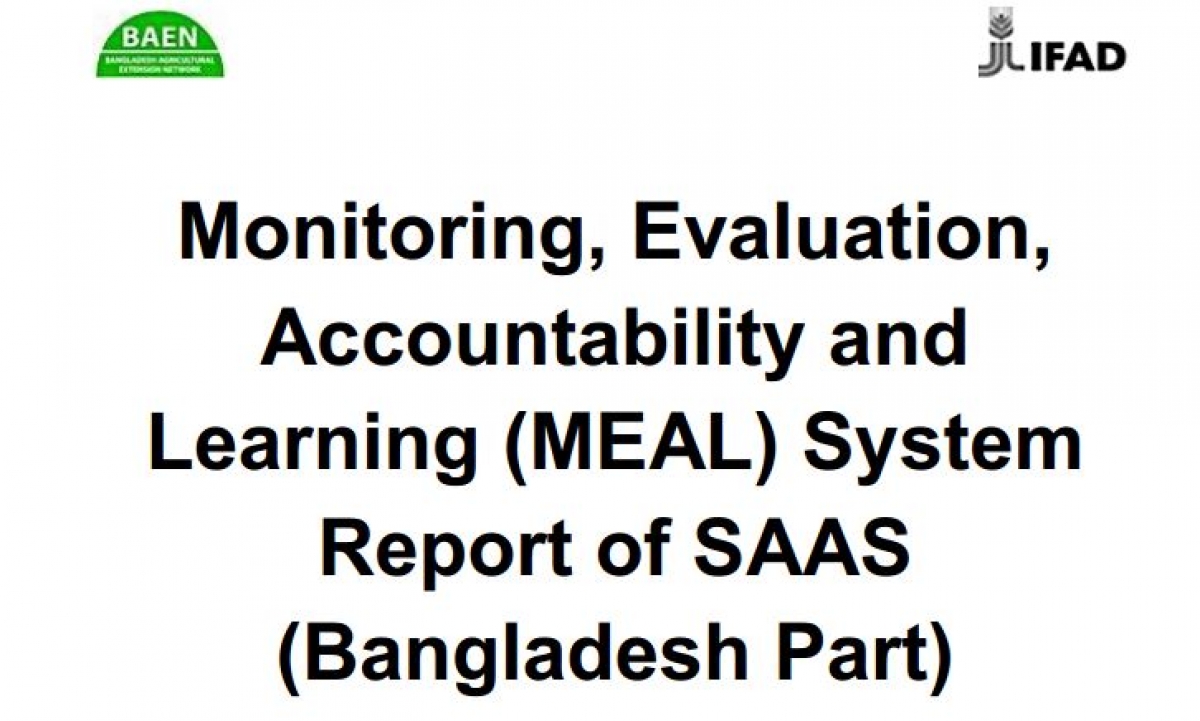
Monitoring, Evaluation, Accountability and Learning (MEAL) System Report of SAAS (Bangladesh Part)
Prepared by: Abdullah-Al-Shakib, MEAL Consultant(SAAS, Bangladesh)
Submitted to: Prof. Dr. Md. Sekender Ali
National Focal Point, (SAAS, Bangladesh), Secretary General, BAEN
& Pro-Vice Chancellor, Sher-e-Bangla Agricultural University, Dhaka, Bangladesh
The Society for Bangladesh Agricultural Extension Network (BAEN) has been implementing IFAD funded “Supporting Smallholder Farmers in Asia and Pacific Islands Region through Strengthened Agricultural Advisory Services (SAAS)” project with the aims to empower smallholder farmers in Bangladesh through improved, more effective and demand-driven Agricultural Advisory Services (AAS). The project is being implemented in Bangladesh, Fiji, and the Philippines through Southeast Asian Regional Center for Graduate Study and Research in Agriculture (SEARCA) in close collaboration with the Asia Pacific Island Rural Advisory Services Network (APIRAS). APIRAS and Agricultural Extension in South Asia (AESA) are providing technical guidance and support.
BAEN has been a country-wide network of agricultural extension actors and serves as a national platform for coordination and exchange of knowledge and information in Bangladesh. It aims to promote sustainable growth and agricultural productivity through identification, documentation and dissemination of good agricultural practices and extension approaches for environment-friendly and socio-economic growth in Bangladesh. The network consists of representatives from national government agencies, industry-specific government organizations, universities, local and international NGOs,farmers/traders associations, agricultural media practitioners, registered agricultural professional associations and the private sector. The specific objectives of the project are:
Strengthen individual and organizational capacities of agricultural advisory service stakeholders in target countries and at regional and sub-regional level, which will directly benefit both the poor farmers, indigenous communities, and producer’s organizations.
Facilitate the availability and accessibility of appropriate and up-to-date knowledge and evidence on innovative advisory services from a range of sources in the Asia-Pacific region (through country fora and through APIRAS) and worldwide (through GFRAS).
The project in Bangladesh part comprises of four major activities: (1) Capacity assessment of country fora, (2) Human resource capacity building, (3) Strengthening knowledge management, and (4) Policy engagement in high level policy dialogue. Target Stakeholders of this project include a) Regional and sub-regional AAS service providers from public, private, and civil society sectors, b) Farmer/producers’ organizations as providers and clientele of AAS, c) Public/private/civil society extension and AAS organizations in the project countries, d) Higher education institutions providing education and research in AAS though KM, e) Local and national government units and policy makers, and f) IFAD Country Programs.
Five thematic areas were identified in the Planning and consultation workshop (held during 01-02 April 2017) for improving the capacity of agricultural extension and advisory services (AEAS) in Bangladesh. Five Working Groups (WG) were formed to work on the five thematic areas to critically review the on-going works and good extension approaches and practices, to define the agenda for learning events under each of the 5 priority areas, and also to provide advice on the curricula for priority learning modules.
Based on these buildups, the objective of the assignment is to evaluate project’s relevance to its goal and objectives, effectiveness of its interventions against set indicators, impact it could create, sustainability of the good practices and project efficiency.
Specific objectives for this evaluation are:
Determine relevance of the project interventions and activities against project goal, objectives, GOB mandate and policies.
Measure effectiveness of the interventions.
Determine how much change has happened with regard to project outcome indicators.
Measure impact that can be attributed to strengthened extension services.
Determine whether there is any systemic change in extension service system or activities and whether the changes would sustain after project closure.
Draw key lessons learned so far that can contribute to the institutional learning for its partners and also for designing future projects for scale up.
Identify gaps in implementation and generate recommendation for future action.
